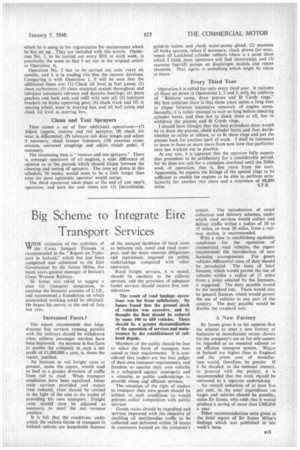Big Scheme to Integrate Eire Transport Services
Page 41

If you've noticed an error in this article please click here to report it so we can fix it.
WADE extension of the activities of Yv the Cores lompair Eireann is recommended in the "Report on Transport in Ireland," which has just been completed and submitted to the Eire Government by Sir James Milne, for many years general manager of Britain's Great Western Railway.
Sir James was asked to suggest a plan for transport integration, to examine the financial position of C.I.E., and recommend a foundation on which economical working could be obtained. He began his survey at the end of July last year.
Increased Fares?
The report recommends that longdistance bus services running parallel with the railways should be withdrawn when railway passenger services have been improved. An increase in bus fares to enable the company to earn a net profit of £1,000,000 a year, is, States the report, justified.
An increase in rail freight rates at present, states the report, would tend to lead to a greater diversion of traffic from rail to road. When transport conditions have been equalized, better train services provided and transit time reduced, rates should be revised in the light of the cost to the trader of providing his own transport. Freight rates should then be adjusted as necessary to meet the net revenue position.
It is felt that the conditions under which the various forms of transport in Ireland operate are inequitable because of the unequal incidence of track costs as between rail, canal and road transport, and the more onerous obligations and restrictions imposed on public undertakings compared with other operators.
Road freight services, it is stated, should be ancillary to the railway services, and the provision of adequate feeder services should receive first consideration.
The result of road haulage operations was far from satisfactory. Sir James found that the present stock of vehicles was excessive, and he thought the fleet should be reduced by some 100 to 650 vehicles. There should be a greater decentralization of the operation of services and maintenance by the establishment of railhead depots.
Members of the public should be free to select the form of transport best suited to their requirements. It is considered that traders are the best judges of their own transport requirements, and freedom to operate their own vehicles is a safeguard against monopoly and a stimulus to public undertakings to provide cheap and efficient services.
The retention of the right of traders to transport their own goods should be subject to such conditions as would prevent, unfair competition with public services Goods trains should be expedited and services improved with the objective of enabling all merchandise traffic to be collected and delivered within 24 hours to customers located on the company's system. The introduction of zonal collection and delivery schemes, under which road services would collect and deliver traffic within a radius of 10 to 15 miles, or even 20 miles, from a railway station, is recommended.
With a view to establishing equitable conditions for the operation of commercial road vehicles, the report recommends the introduction of new licensing arrangements. For goods vehicles differential rates of duty should be introduced. 'The issue of local licences, which would permit the use of vehicles within a radius of 15 miles from a point selected by the licensees, is suggested. The duty payable would be the standard rate. There would also be general licences, which would permit the use of vehicles in any part of the country. The duty payable would be double the standard rate.
A New Factory
Sir James gives it as his opinion that the scheme to erect a new factory at lnchicore to manufacture motor chassis for the company's use or for sale cannot be regarded as an essential adjunct to an efficient transport system. Wages in Ireland are higher than in England and the prime cost of manufacture would, therefore, be greater If it be decided, in the national interest, to proceed with the project, it is recommended that the work should be entrusted to a separate undertaking.
An overall reduction of at least five per cent. in the total expenditure on wages and salaries should be possible, states Sir James, who adds that it would produce a saving of more than £300,000 a year.
Other recommendations were given in the brief report of Sir James Milne's findings which was published in last week's issue.




















































































